isaiah
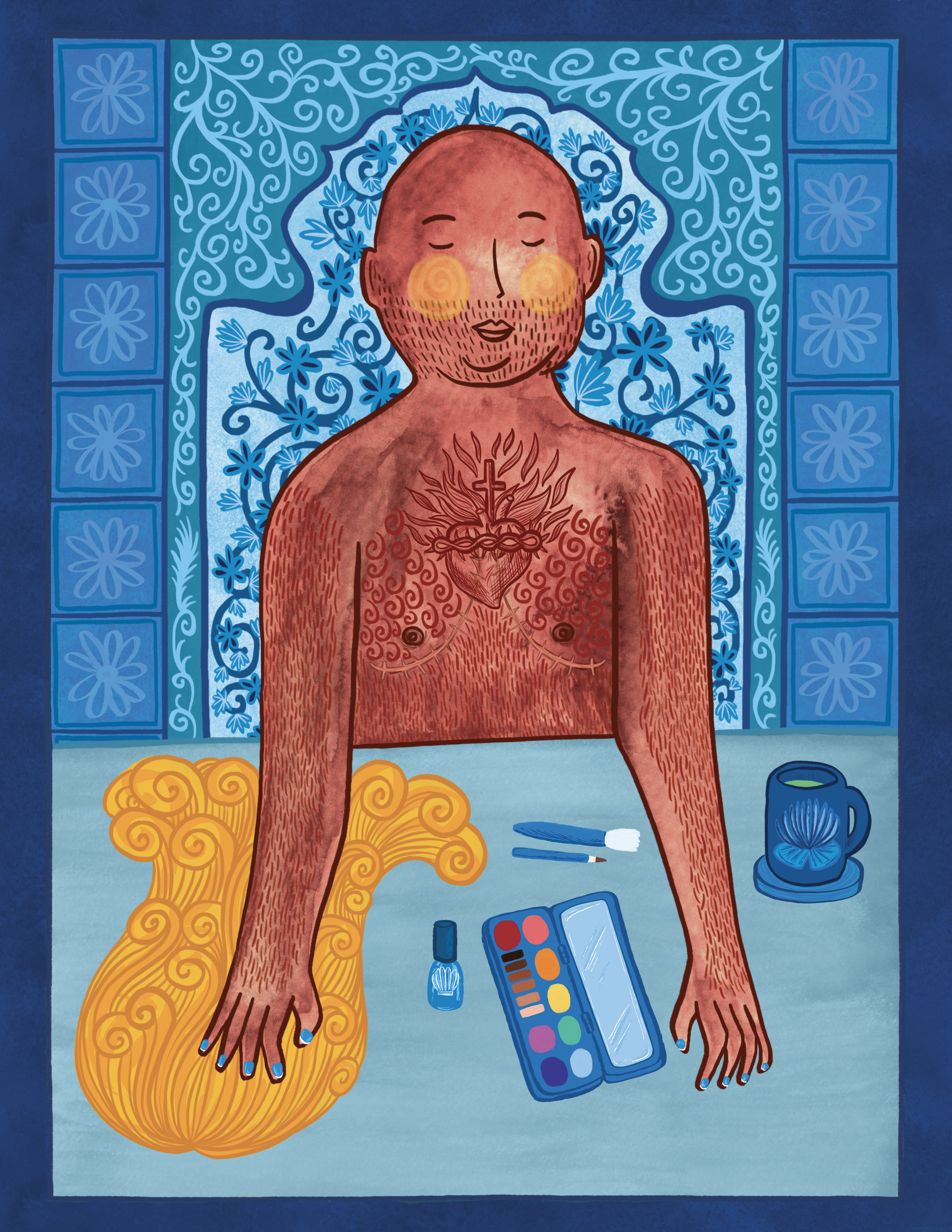
Isaiah 61:7 – Instead of your shame there shall be a double portion; instead of dishonor they shall rejoice in their lot; therefore in their land they shall possess a double portion; they shall have everlasting joy.
The biggest challenge for this series was taking a very patriarchal and overtly heteronormative list of male prophets – and thinking of how I could even crack open the binaristic world of “us” and “them” that is typical of the prophecies about Israel. Isaiah gave me a gentler start as he had a wife, unnamed in scripture, who was called the prophetess. I wanted to see Isaiah as someone who existed as a genderqueer person, and for their society was both prophet and prophetess. The aesthetics of gendered identities just serve to highlight for others what we feel about ourselves – and I wanted a little whimsy with this. There is a Barbie blonde wig on the table in a setting inspired by the Blue Mosque.
Jeremiah

Jeremiah 1:7 – But the LORD said to me, “Do not say, ‘I am only a youth’; for to all to whom I send you, you shall go, and whatever I command you, you shall speak.
This was the prophet I was drawn to the most. There’s a kind of learned helplessness with your personal voice when you live in a country with Out of Bounds Markers for what can and cannot be said in the public sphere. There are clearly scripted boundaries that children and youths are commanded to speak (or stay silent) within. To obey a command like this, Jeremiah had to trust completely in the Lord’s guidance – and may have just been terrified about being reprimanded again. In this illustration I wanted to reframe the hesitant rebuttal of “I am only a youth”. It is the voice of youth, of the inner child scrawling out doodles and thinking wonderful things that is the strongest and clearest.
Ezekiel
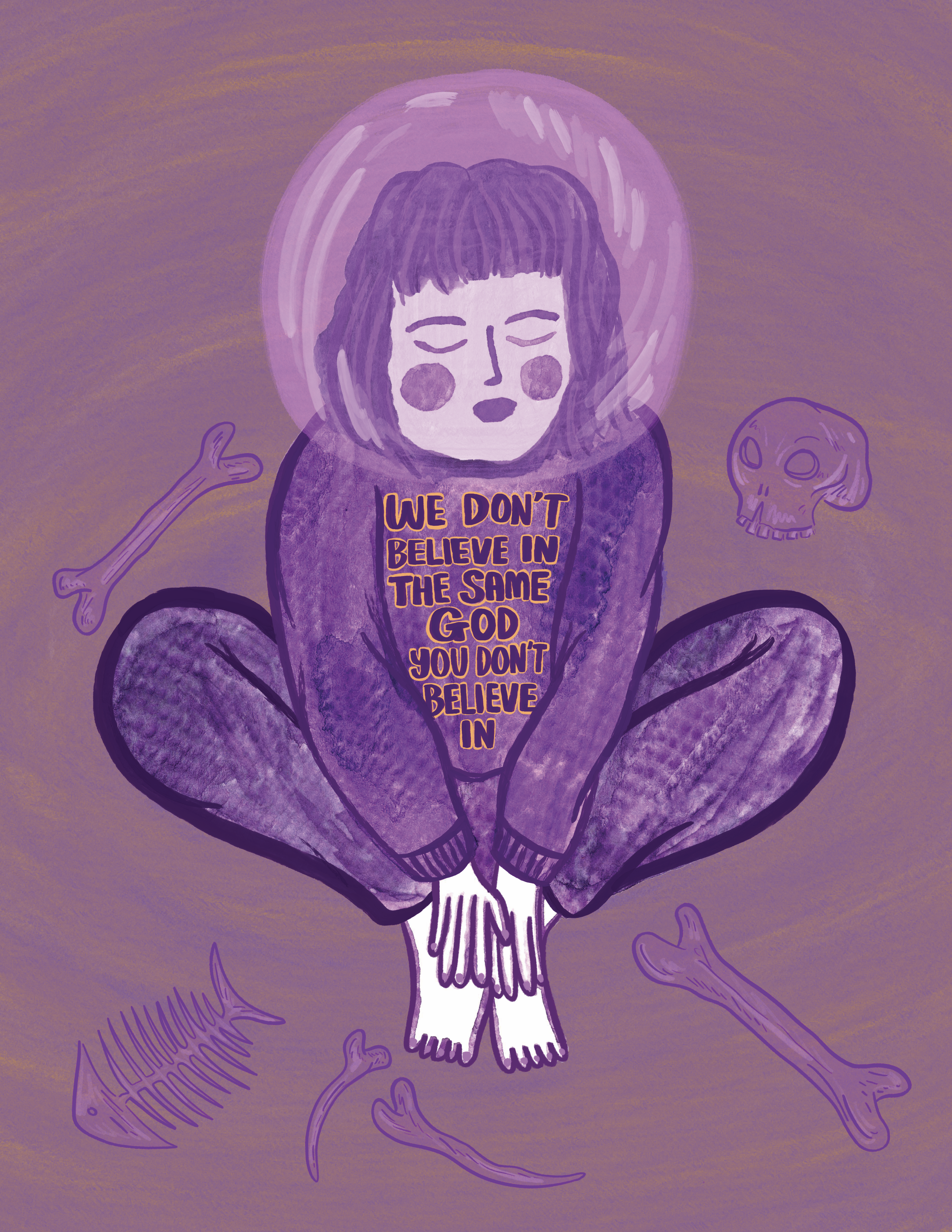
Ezekiel 37:9 – Then he said to me, “Prophesy to the breath; prophesy, son of man, and say to the breath, Thus says the Lord God: Come from the four winds, O breath, and breathe on these slain, that they may live.”
Ezekiel and the valley of the dry bones has a special place in my psyche. The vision of a zombie army is probably the most incredible fever dream meets blockbuster movie moment in the Bible. Then my friend sent me this photo of a signboard outside a church in Vancouver where she is right now – it had the declaration “WE DON’T BELIEVE IN THE SAME GOD YOU DON’T BELIEVE IN”. And I got to thinking about how I might not have left the church I grew up in if I felt free to breathe freely and express myself there in the presence of a God I believe in. So instead of presenting Ezekiel as a martial figure, potentially a guerilla fighter making the dead rise and live again, I wanted Ezekiel to be a person just trying to exist in stranger air and deal with whatever is in store.
Daniel
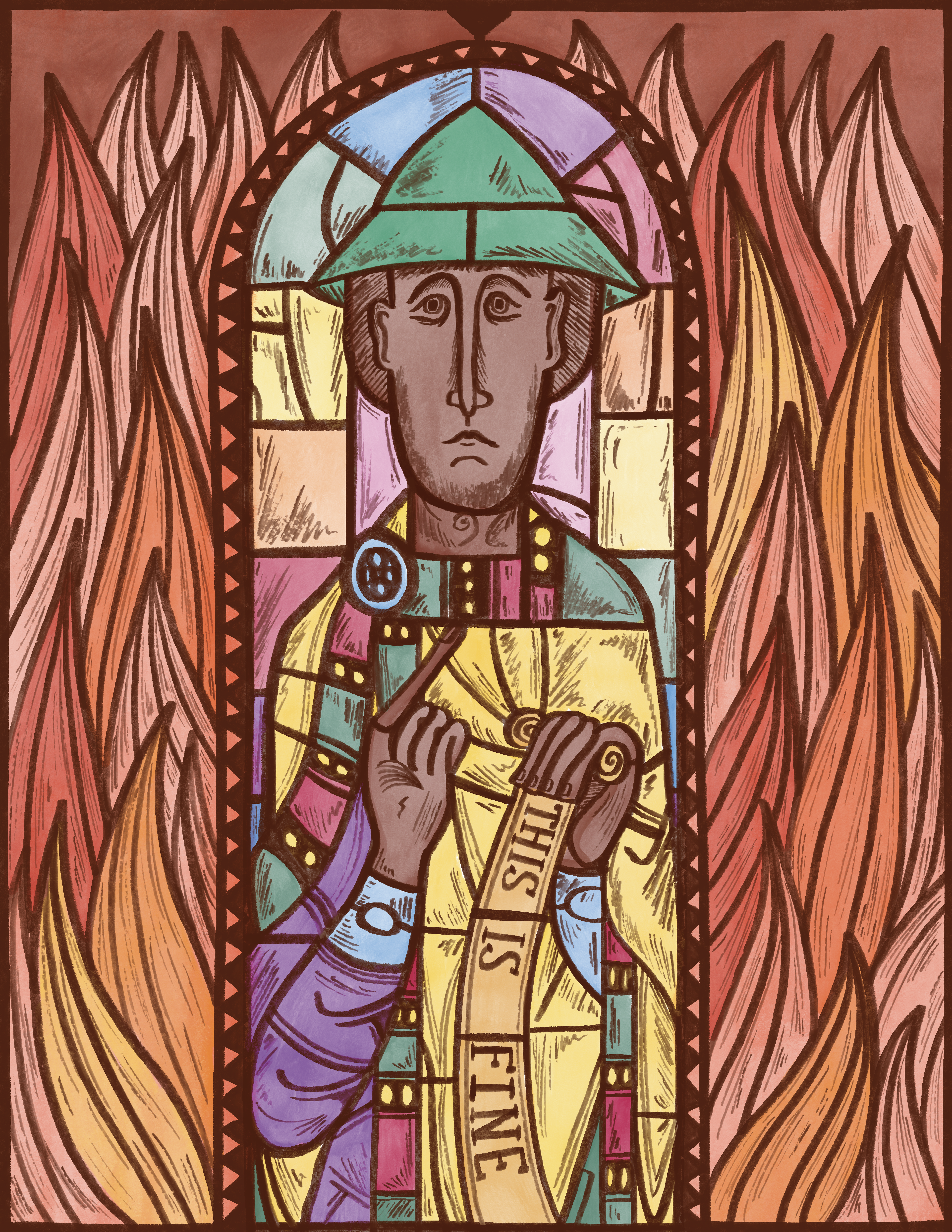
Daniel 6:18 – Then the king went to his palace and spent the night fasting; no diversions were brought to him, and sleep fled from him.
This illustration of the Prophet Daniel was inspired by the stained glass window of Augsburg Cathedral, dated to the late 11th-early 12th centuries. Even though he was not in the fiery furnace with Shadrach, Meshach, and Abednego, he was a contemporary of them and preserves the memory of them (?). My brain flits back and forth between that account and Daniel’s own experience of being thrown into the lion’s den – and thinking of such literally dire circumstances makes me think of the “This is Fine” meme. The Bible seems to suggest stoicism and utter faith in being saved – but sometimes it also feels like the prophets only survived because there was no other way to live. Past the point of desperation, perhaps there is equanimity in knowing there is nothing else one can do. In contrast to the deep sleep of the blameless, we have King Darius in agony over Daniel’s supposedly inevitable fate in the lion’s den.
hosea
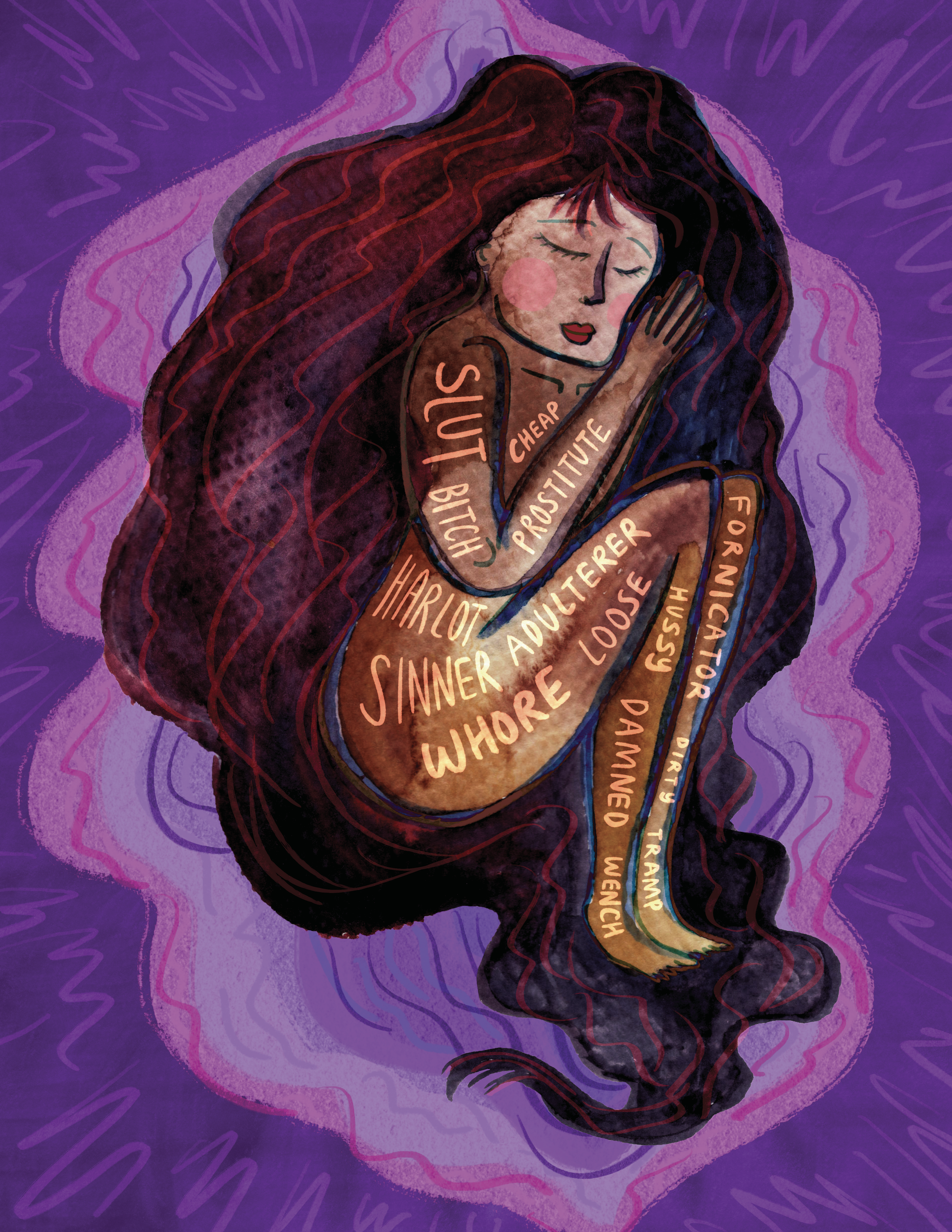
Hosea 3:1 – And the Lord said to me, “Go again, love a woman who is loved by another man and is an adulteress, even as the Lord loves the children of Israel, though they turn to other gods and love cakes of raisins.”
The story of Hosea and Gomer trips me up each time as he forces Gomer to stay with him, because he ‘bought Gomer back for 6 ounces of silver and 9 bushels of barley.’ (Hosea 3:2). It feels like going from one version of slavery to another. Polyamory is still marginalised – even in many queer communities. Taken out of context, this verse is polytheistic and polyamorous, and there can be permission given to ourselves to love more than one person (or deity). If love is all embracive, then there shouldn’t be such a dismissive tone taken towards people who love cakes of raisins. It will probably take us a long time to truly legitimise sex-work, liberatory sexual behaviour, and have fully wholesome ways of being committed to each other and our communities. Hosea’s “counter-culture” acceptance of Gomer the adulteress was shocking by its radical forgiveness for his times, and I’m still wondering what that can look like for us here and now.
joel
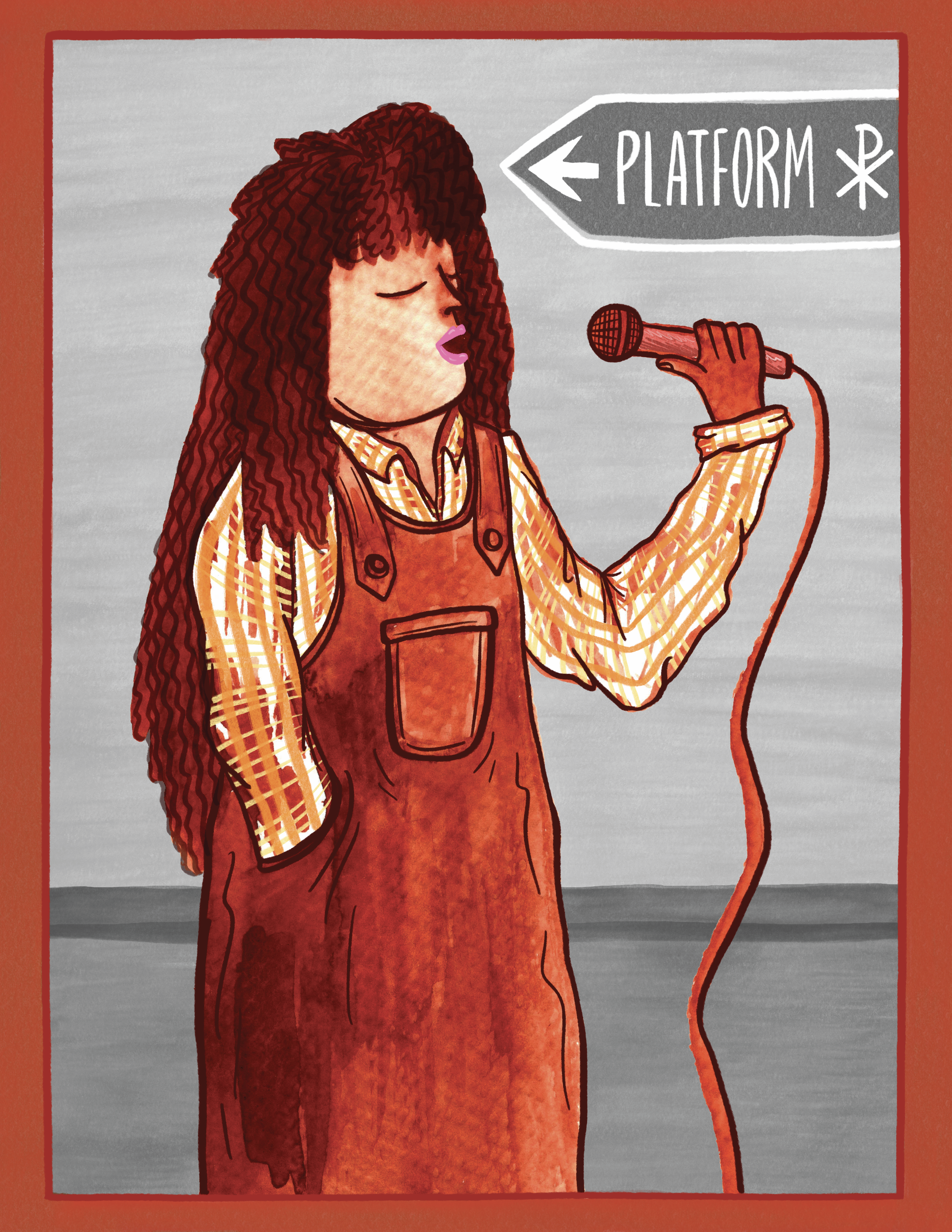
Joel 2:13 – Return to the Lord your God, / for he is gracious and merciful, / slow to anger, and abounding in steadfast love; / and he relents over disaster.
I am still personally struggling with this concept of a God who ‘relents over disaster’. It is a relief to hear the mercifulness but at the same time this same God is avenging and wrecking disaster over the “enemies”. I am not sure how to represent this but I’m now remembering how difficult it was listening to sermons where preachers confidently talked about a justly vengeful God when scanning through Joel. It is easier for me to listen to a musician on the sidewalk or train station than a preacher from the pulpit. Especially when I am a tourist rather than a resident of that city, I am somehow more able to slow my pace, stop and take the time to listen to songs. So I’m imagining Joel as a prophet singing prophetic songs like “Streets of London” by Ralph McTell, “Delilah” by Florence and the Machine, and “Jesus from Texas” by Semler.
amos
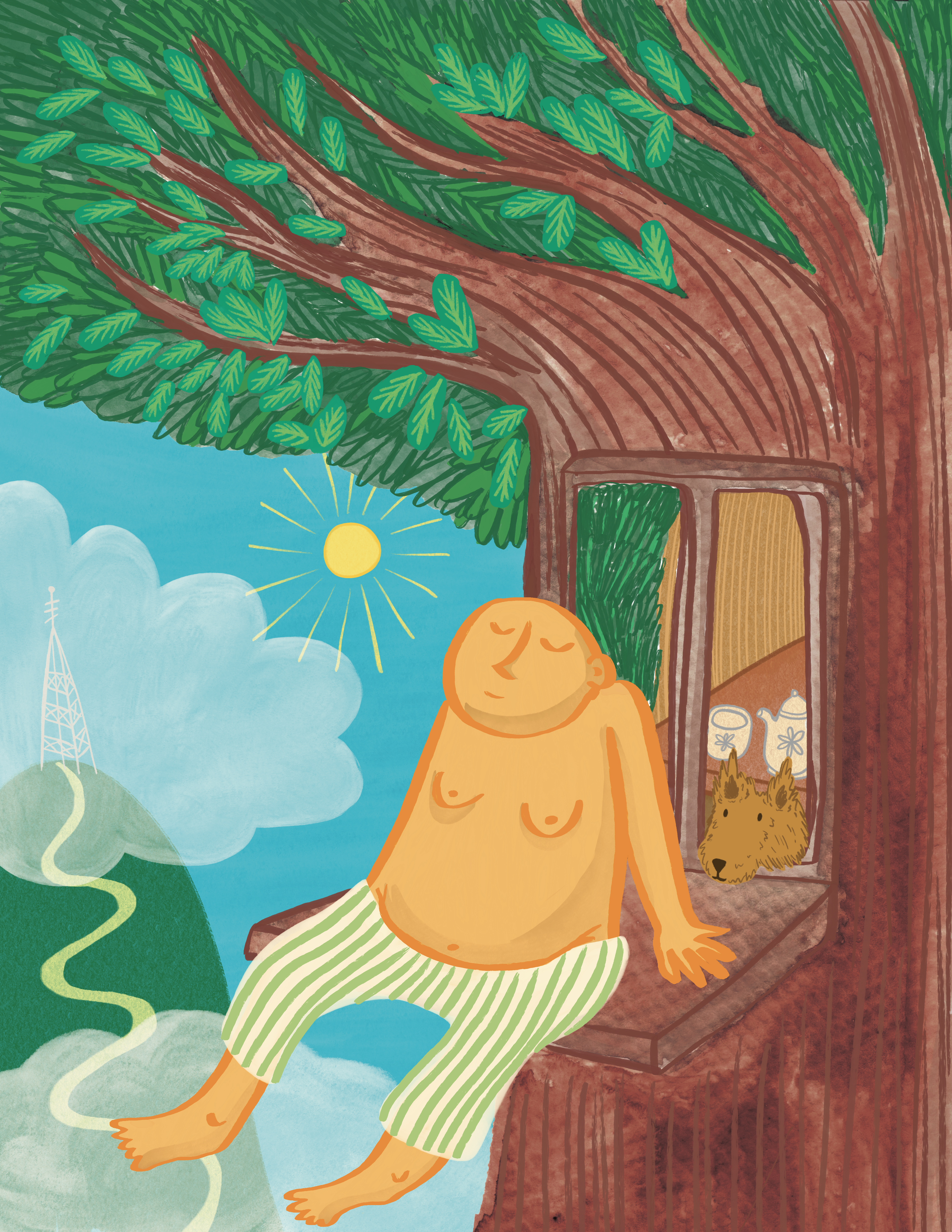
Amos 9:13-15 – “Behold, the days are coming,” declares the Lord, “when the plowman shall overtake the reaper and the treader of grapes him who sows the seed; the mountains shall drip sweet wine, and all the hills shall flow with it. 14 I will restore the fortunes of my people Israel, and they shall rebuild the ruined cities and inhabit them; they shall plant vineyards and drink their wine, and they shall make gardens and eat their fruit. 15 I will plant them on their land, and they shall never again be uprooted out of the land that I have given them,” says the Lord your God.
This was such a hopeful section. A deus ex machina of sorts where the Earth will be restored and renewed. As much as prophets are in times of crisis, I wanted this illustration of Amos to show some measure of experiencing bliss of the world we live in. In the records, Amos was previously a shepherd and sycamore fig farmer, someone who would know very intimately the cycles of the seasons and care for flora and fauna. In these verses I also feel there can be a solarpunk interpretation of how civilization can be built with attentiveness to the land, and that this is not a vision alienated from the lavish pleasure of savouring the fruit of gardens. I have been inspired by Becky Chambers’ Monk and Robot series, and its interpretation of a belief system that is focused on hospitality – for both the host and the guest.
obadiah
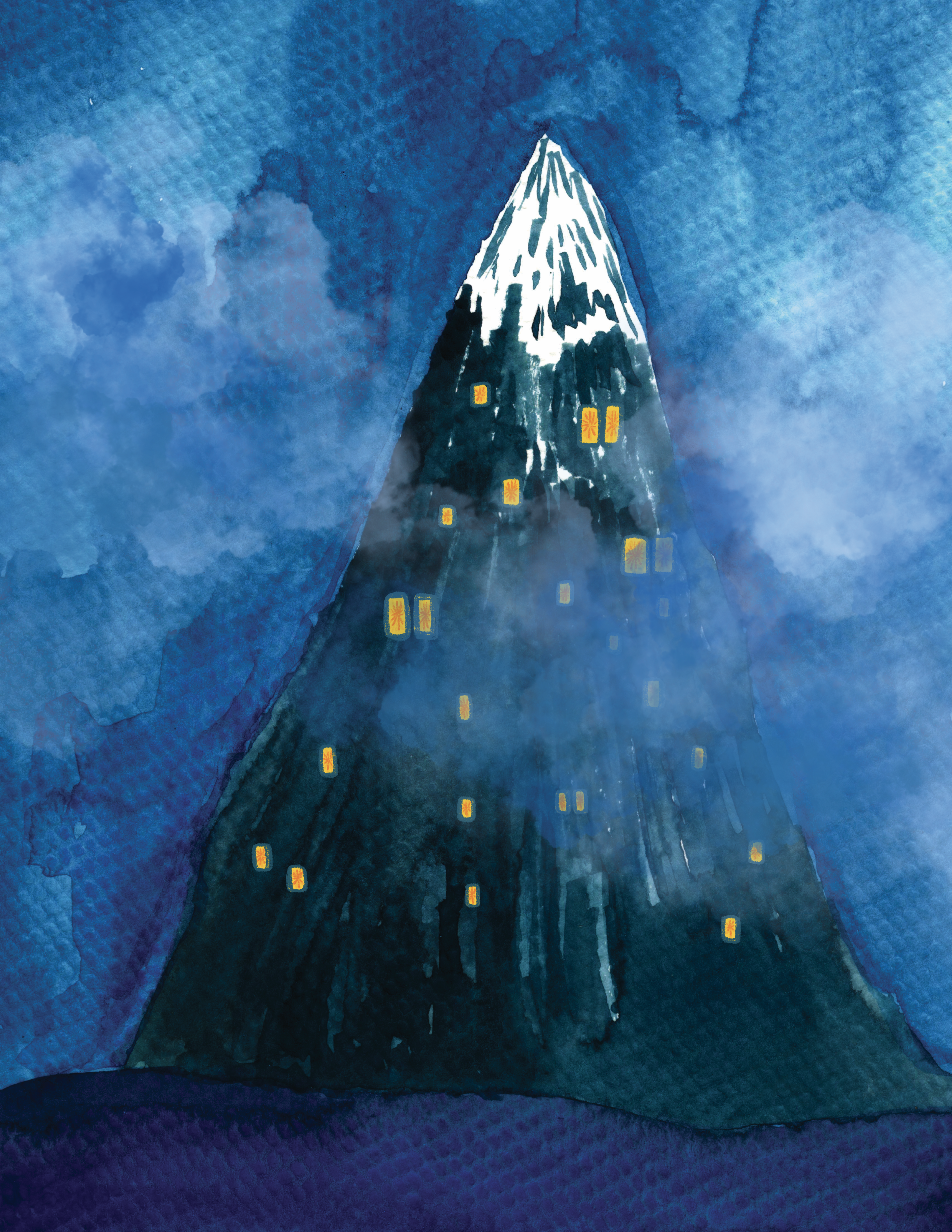
1 Kings 18:4 – and when Jezebel cut off the prophets of the LORD, Obadiah took a hundred prophets and hid them by fifties in a cave and fed them with bread and water.
This is a haunting story for me, Obadiah saving a hundred prophets in two caves, working within a corrupt system to save people from persecution. The only way he could do it was by being chief of staff in the palace of King Ahab and Queen Jezebel – a contemporary equivalent is a civil servant who covertly works for anti-government protesters. Right now, people are working to help migrant workers and refugees, with untenable laws that force them most vulnerable into hiding from the governments which were meant to protect people. This particular news article of refugees from Bangladesh in Hong Kong has kept me pondering for months now. Providence needs to look like more than being fed bread and water in a cave till the crisis passes – even while that can sound miraculous and hopeful when the story is retold.
jonah

Jonah 4:5-7 – Jonah went out of the city and sat to the east of the city and made a booth for himself there. He sat under it in the shade, till he should see what would become of the city. 6 Now the Lord God appointed a plant and made it come up over Jonah, that it might be a shade over his head, to save him from his discomfort. So Jonah was exceedingly glad because of the plant. 7 But when dawn came up the next day, God appointed a worm that attacked the plant, so that it withered.
Jonah is such a sympathetic character. Jonah is grieved and frustrated and holding a lot of hatred and the last thing he wants to do is prophesy to the Ninevites. He obviously does not want to do what God wants him to do and he gets into so much trouble. I’ve always seen it as a cautionary tale for believers – you better obey or you are going to wish you stopped complaining because God will always win the argument. And you might start to look like a xenophobic asshole when people tell your story. In my imagination, Jonah is a bone-tired climate activist turned climate refugee who just really does not want to be “That Prophet” anymore.
micah
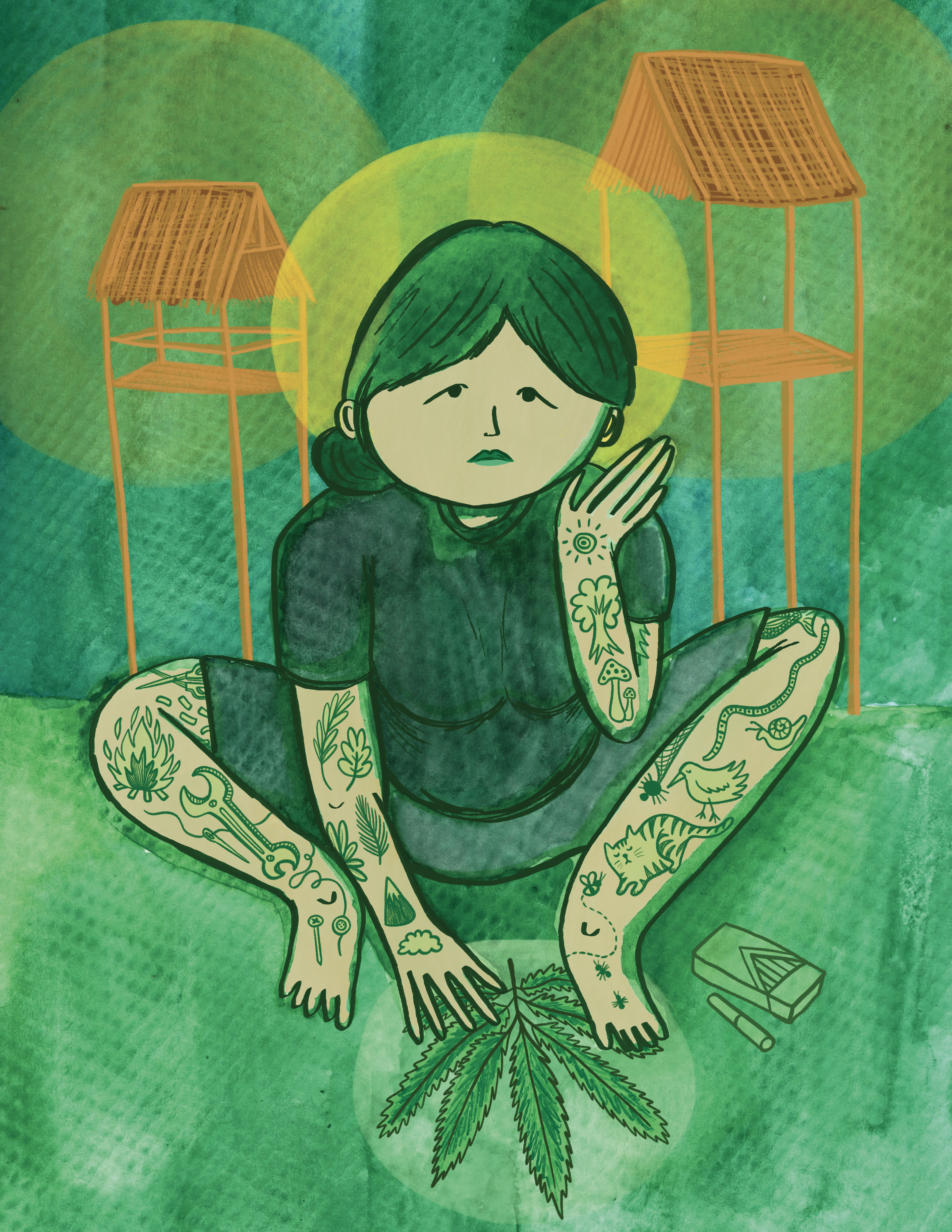
Micah 4:3-4 – He shall judge between many peoples, / and shall decide disputes for strong nations far away; / and they shall beat their swords into plowshares, / and their spears into pruning hooks; / nation shall not lift up sword against nation, / neither shall they learn war anymore; / 4 but they shall sit every man under his vine and under his fig tree, / and no one shall make them afraid, / for the mouth of the Lord of hosts has spoken.
The illusory war against drugs is what inspired this illustration of the Prophet Micah, who seems capable of speaking truth to oppressive entrenchments of power. Private acts of distribution and consumption are lethal when states criminalise and judge these decisions. Very recently, another person was executed in Singapore – this time for abetting the sale of 1 kg (approximaely 2.2. lbs) of marijuana. It is an exhausting fight, from everyone involved – and over a handful of hallucinogenic species growing on this green earth. The imagery of these verses in Micah explain it better – each material can be transformed. Swords into plowshares. Spears into pruning hooks. Perhaps one day we can transform every material into its most gentle and meaningful existence.
Nahum
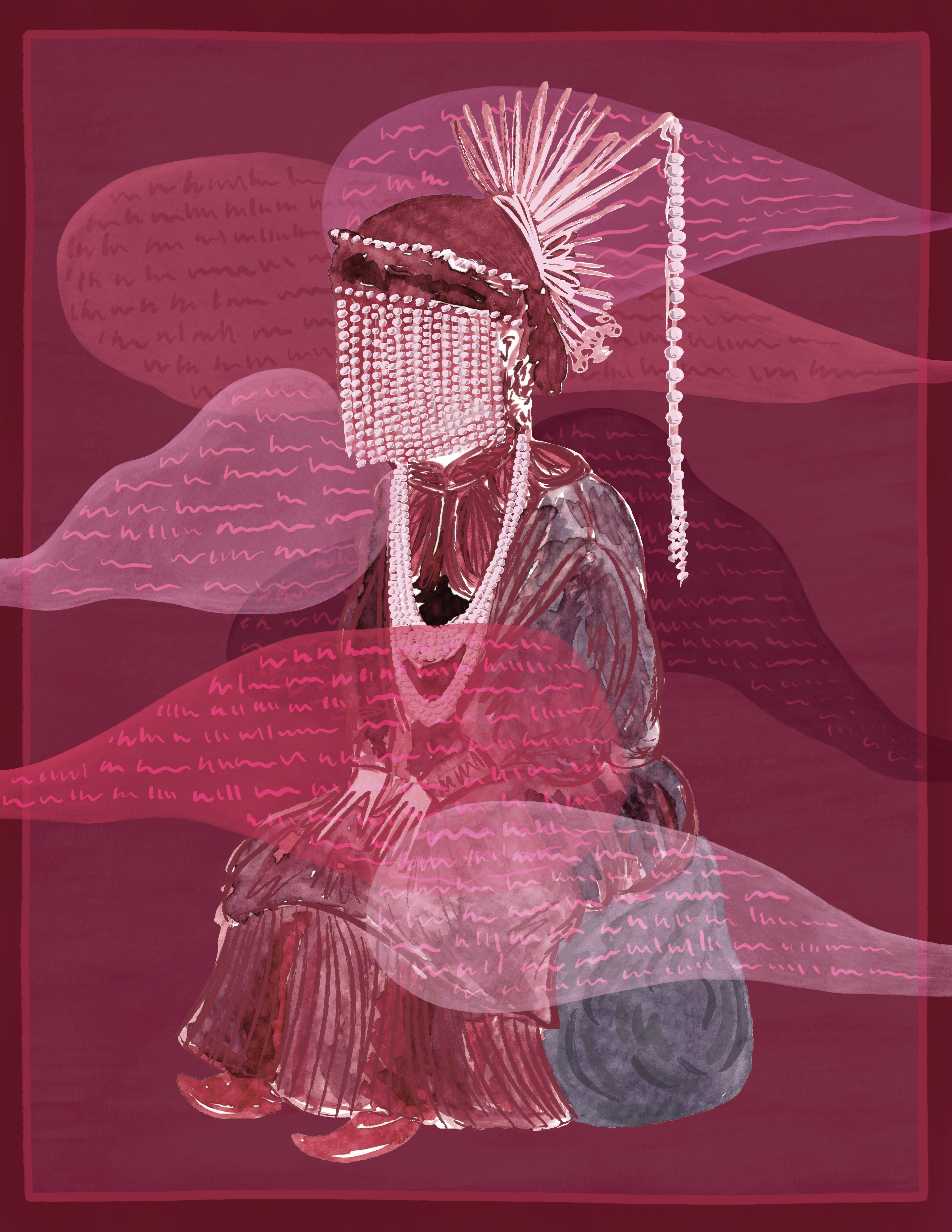
Nahum 3:19 – There is no easing your hurt; / your wound is grievous. / All who hear the news about you / clap their hands over you. / For upon whom has not come / your unceasing evil?
There is so much vehemence and destruction in the book of Nahum. The dark irony is that the name Nahum means “comfort” or “consolation”. This illustration used as reference a photograph of a Chinese bride in Batavia (Jakarta), 1860s, by studio Woodbury and Page. For this prophet I wanted an image of someone who has had to find consolation when being the only one feeling the hurt of a situation. The heaviness of the veil of beads, the stillness of the sitter, gave me another image of what it means to be resigned to one’s circumstances. There may still be agency within these constraints, but it is so hard to articulate the experience of the situations where ‘There is no easing [of] your hurt’.
Habakkuk
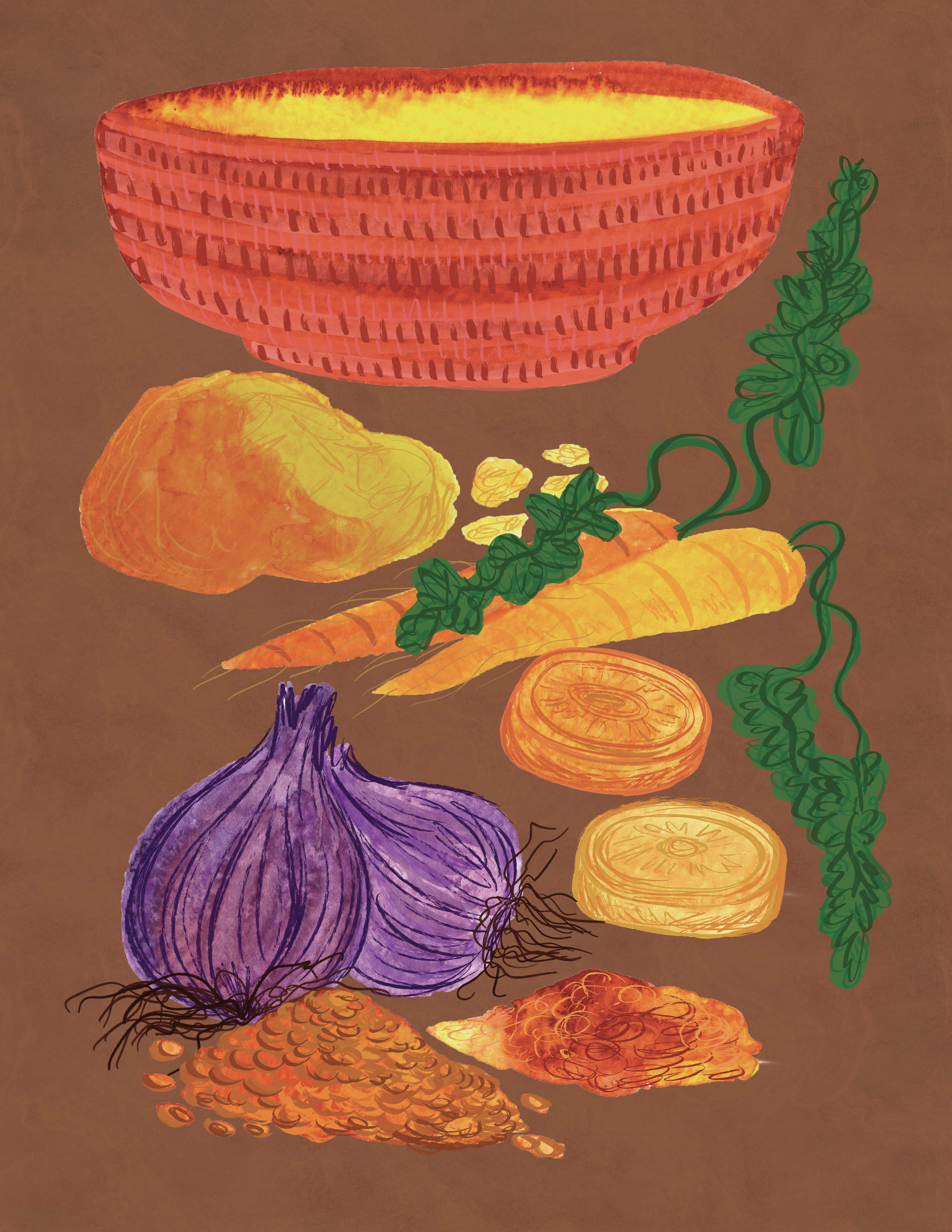
Bel and the Dragon – 33 Now the prophet Habakkuk was in Judea; he had made a stew and had broken bread into a bowl and was going into the field to take it to the reapers. 34 But the angel of the Lord said to Habakkuk, “Take the food that you have to Babylon, to Daniel, in the lions’ den.” 35 Habakkuk said, “Sir, I have never seen Babylon, and I know nothing about the den.” 36 Then the angel of the Lord took him by the crown of his head and carried him by his hair; with a gust of wind he set him down in Babylon, right over the den.
37 Then Habakkuk shouted, “Daniel, Daniel! Take the food that God has sent you.” 38 Daniel said, “You have remembered me, O God, and have not abandoned those who love you.” 39 So Daniel got up and ate. And the angel of God immediately returned Habakkuk to his own place.
I felt rather indignant on Habakkuk’s behalf. He gets ready a stew for the reapers- a variation of a modern day cafeteria cook or a soup kitchen organiser – and all that stew is given to Daniel (that would be a lot of stew). The way he is carried as well – ‘by the crown of his head and carried…by his hair’. My vision of Habakkuk in this illustration is of a bone-tired social worker in a soup kitchen yanked into submission by angels. What I wanted to focus on was the attention to the ingredients, the craft of nourishing with food. That detail, of how an angel interrupts a meal just before it is going to be served, is a very human moment of disgruntlement when one is forced to be hospitable to ill-timed requests.
Zephaniah
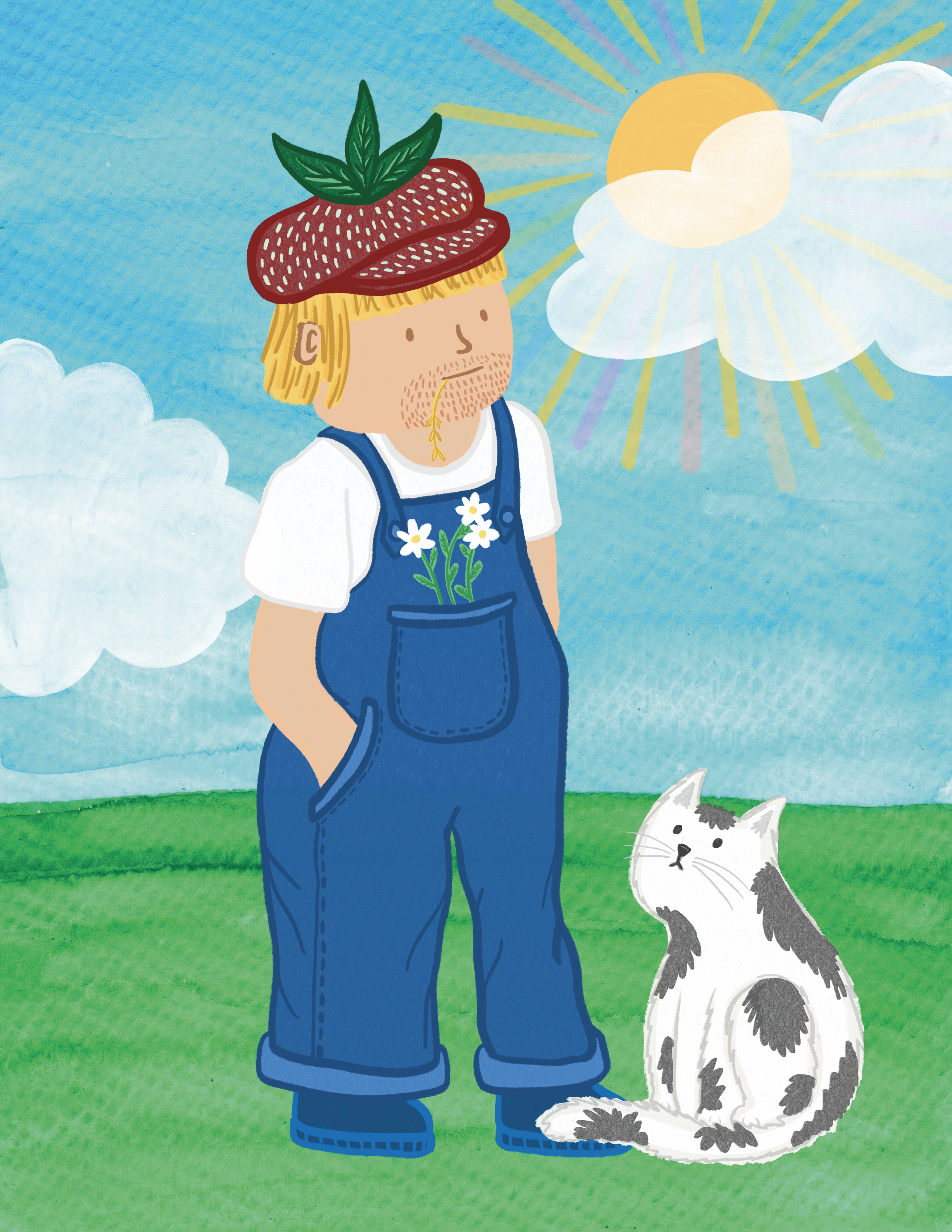
Zephaniah 3:12-13 – But I will leave in your midst / a people humble and lowly. / They shall seek refuge in the name of the Lord, / 13 those who are left in Israel; / they shall do no injustice / and speak no lies, / nor shall there be found in their mouth / a deceitful tongue. / For they shall graze and lie down, / and none shall make them afraid.
For Zephaniah, I wanted to explore an image of simple living – the people who are ‘humble and lowly’ who will ‘graze and lie down’. I wanted to include some personal details – my strawberry hat, denim overalls which are on my wishlist, fresh wild flowers, and a cow-cat which I hope will be in my pawrenting future. There are so many options for what a restored world will look like – I hope we can create that refuge amongst ourselves.
Haggai
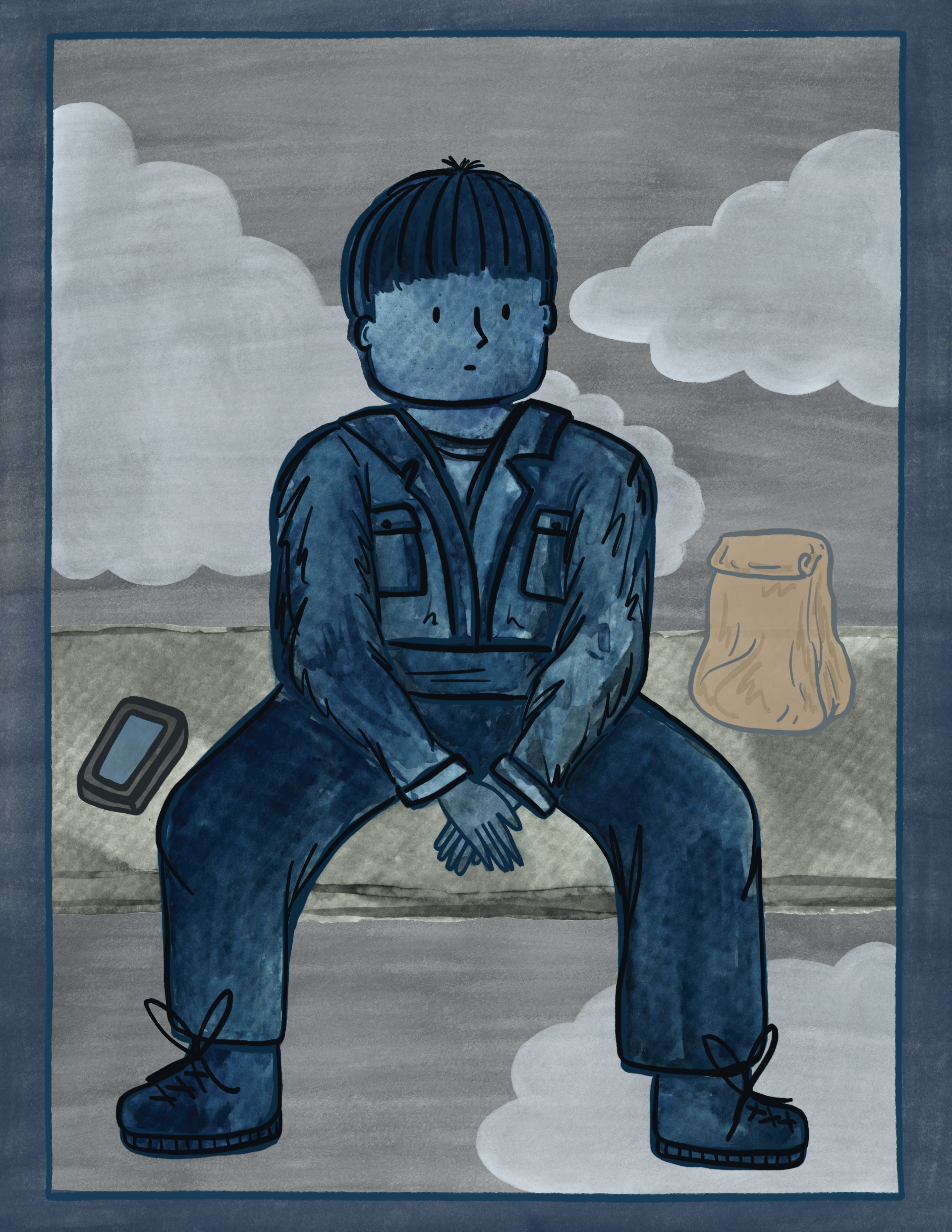
Haggai 2:7-9 – 7 And I will shake all nations, so that the treasures of all nations shall come in, and I will fill this house with glory, says the Lord of hosts. 8 The silver is mine, and the gold is mine, declares the Lord of hosts. 9 The latter glory of this house shall be greater than the former, says the Lord of hosts. And in this place I will give peace, declares the Lord of hosts.
Many of the prophets of the Old Testament are obsessed with rebuilding the temple, a sign that God is again amongst His people and a loud claim to every enemy about the strength of Israel. For Haggai, I thought of a construction worker taking a lunch break while high up in the sky. Haggai and Zechariah had worked together to restart the work on the temple, and I thought it would be good to think about the labour of its construction. I am thinking of Thrust by Lidia Yuknavitch, where the people constructing the edifice may be the same people who are alienated from the belief systems which started the building plans. In these verses, the language is exclusionary, benefiting only the Israelites. The promise is for ‘the treasures of all nations’ to come into only Israel’s God’s temple. There is a chance that Haggai no longer saw this divide, could not see the need to amass the treasures of other places. I wanted this image to capture the moment of reckoning in the middle of one’s work day.
Zechariah
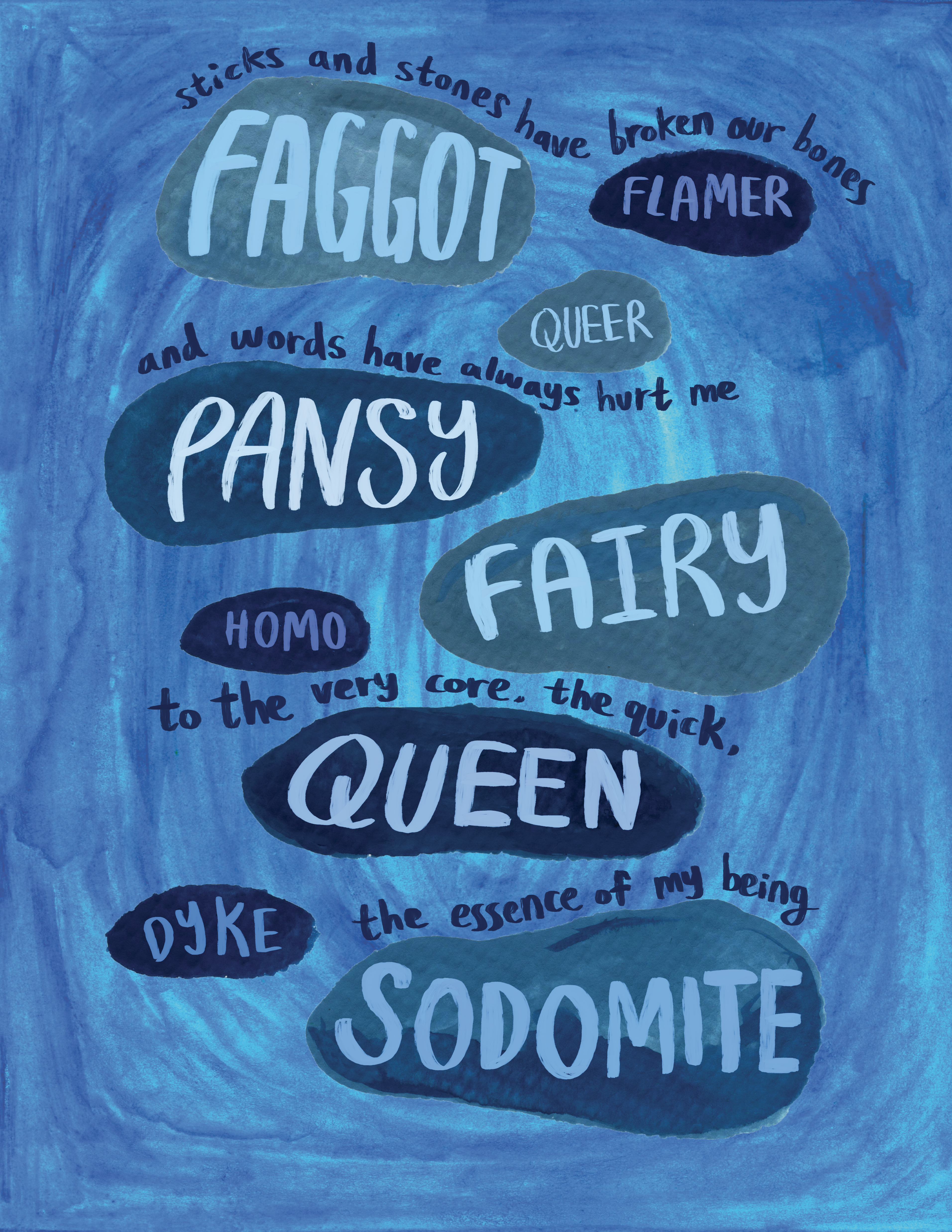
Zechariah 9:9 – The Coming King of Zion – Rejoice greatly, O daughter of Zion! / Shout aloud, O daughter of Jerusalem! / Behold, your king is coming to you; / righteous and having salvation is he, / humble and mounted on a donkey, / on a colt, the foal of a donkey.
2 Chronicles 24:20-21 – the Spirit of God clothed Zechariah the son of Jehoiada the priest, and he stood above the people, and said to them, “Thus says God, ‘Why do you break the commandments of the Lord, so that you cannot prosper? Because you have forsaken the Lord, he has forsaken you.’” But they conspired against him, and by command of the king they stoned him with stones in the court of the house of the Lord.
Zechariah is a prophet that I knew only as the person who foretold the arrival of Jesus in Jerusalem. Digging a little further, I found the story of the fall of Jerusalem and the subsequent massacre upon the altar of the temple by Nebuzaradan, captain of the Babylonian guard who hopes to make amends for the seething blood of Zechariah. ‘The portents and loss of oracles that follow upon the blood of Zechariah in Lives of the Prophets end the book…The silence of the temple in the wake of Zechariah’s blood seems to augur a larger silence; an end of prophecy, perhaps of temple too.’ With this illustration I wanted to focus on his death by stoning more than his prophecy, as a way of working through with queer grief and guilt about the way we have had or still have to live. Nothing seems to make amends for the seething blood sometimes, but working through that into gentle vulnerability is necessary if we want to survive the trauma. I’m also inspired by the poem by Alok V. Menon that begins “sticks & stones may break my bones but words will never hurt me.” and transforms that pithy, platitude of useless armour into “sticks & stones may break my bones but words will disappear them”.
Malachi
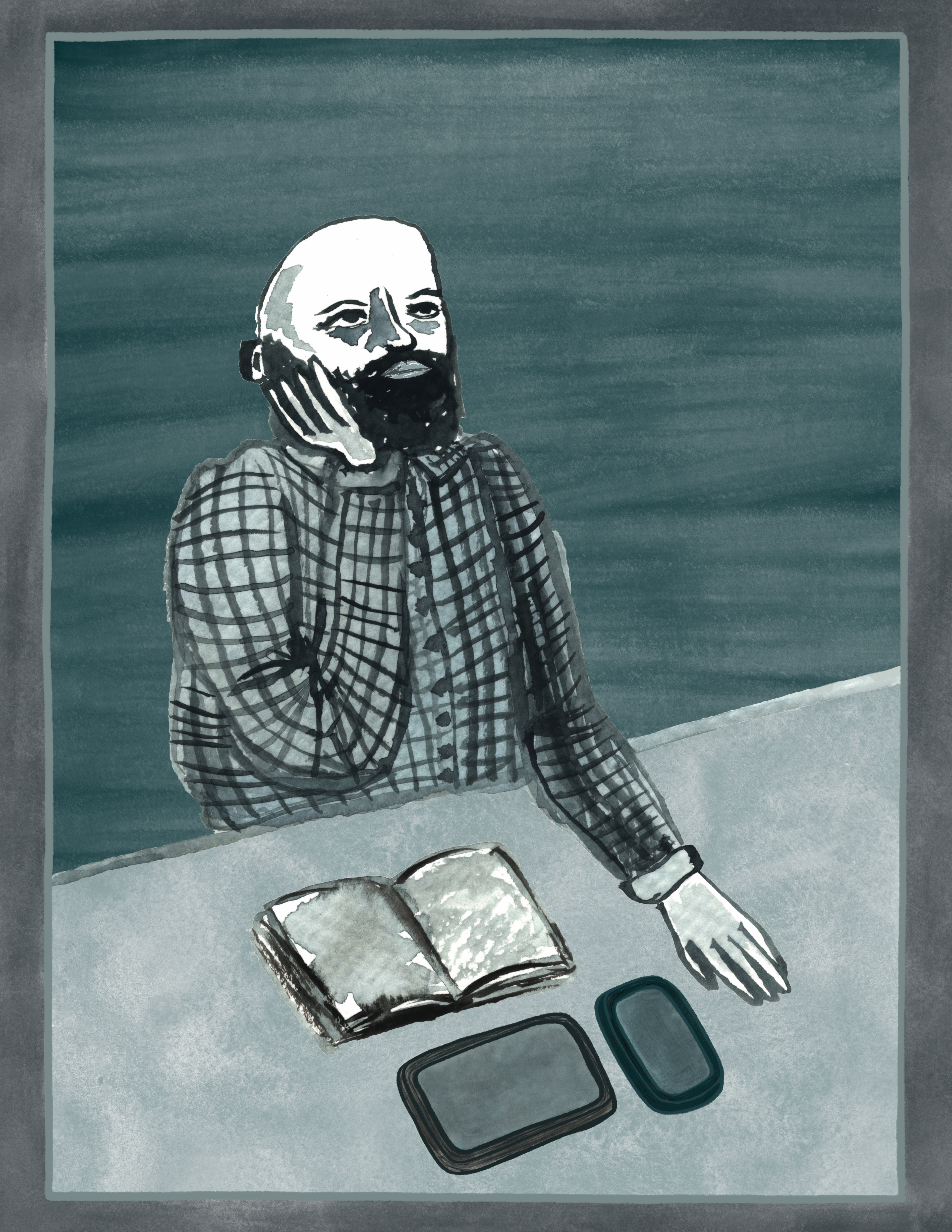
Malachi 3:1-4 – “I will send my messenger, who will prepare the way before me. Then suddenly the Lord you are seeking will come to his temple; the messenger of the covenant, whom you desire, will come,” says the Lord Almighty. 2 But who can endure the day of his coming? Who can stand when he appears? For he will be like a refiner’s fire or a launderer’s soap. 3 He will sit as a refiner and purifier of silver; he will purify the Levites and refine them like gold and silver. Then the Lord will have men who will bring offerings in righteousness, 4 and the offerings of Judah and Jerusalem will be acceptable to the Lord, as in days gone by, as in former years.
It’s not easy waiting for a prophecy to be fulfilled by an all-mighty deity who works in Their own mysterious times and ways. I see Malachi as a church worker in stasis – working and praying every day because that is all their lives are built upon. Servitude and devotion to their Maker who says that you should ‘Therefore, stay awake, for you do not know on what day your Lord is coming. But know this, that if the master of the house had known in what part of the night the thief was coming, he would have stayed awake and would not have let his house be broken into.’ (Matthew 24:42-43). You could wear yourself out waiting for inevitable judgement. Malachi’s verses have offered a bit of balm for me. There is nostalgia in these verses, for the ‘days gone by’, and a recognition that this waiting is part of our desire and seeking. Even with hope and longing there are anxieties about ‘who can endure the day’ of God’s coming. No one said that abiding by the prophecies would be easy, and there’s some solace in that.




Unbound Social